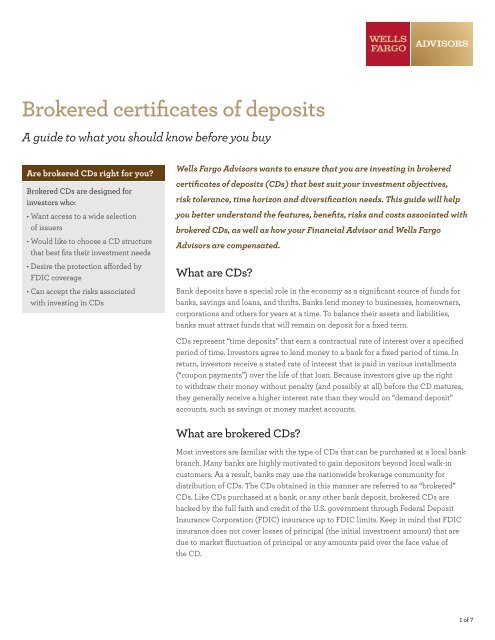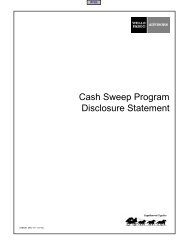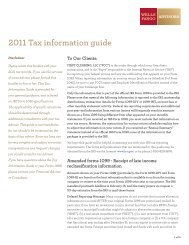Brokered Certificates of Deposits - saf.wellsfargoadv... - Wells Fargo ...
Brokered Certificates of Deposits - saf.wellsfargoadv... - Wells Fargo ...
Brokered Certificates of Deposits - saf.wellsfargoadv... - Wells Fargo ...
You also want an ePaper? Increase the reach of your titles
YUMPU automatically turns print PDFs into web optimized ePapers that Google loves.
<strong>Brokered</strong> certificates <strong>of</strong> deposits<br />
A guide to what you should know before you buy<br />
Are brokered CDs right for you<br />
<strong>Brokered</strong> CDs are designed for<br />
investors who:<br />
• Want access to a wide selection<br />
<strong>of</strong> issuers<br />
• Would like to choose a CD structure<br />
that best fits their investment needs<br />
• Desire the protection afforded by<br />
FDIC coverage<br />
• Can accept the risks associated<br />
with investing in CDs<br />
<strong>Wells</strong> <strong>Fargo</strong> Advisors wants to ensure that you are investing in brokered<br />
certificates <strong>of</strong> deposits (CDs) that best suit your investment objectives,<br />
risk tolerance, time horizon and diversification needs. This guide will help<br />
you better understand the features, benefits, risks and costs associated with<br />
brokered CDs, as well as how your Financial Advisor and <strong>Wells</strong> <strong>Fargo</strong><br />
Advisors are compensated.<br />
What are CDs<br />
Bank deposits have a special role in the economy as a significant source <strong>of</strong> funds for<br />
banks, savings and loans, and thrifts. Banks lend money to businesses, homeowners,<br />
corporations and others for years at a time. To balance their assets and liabilities,<br />
banks must attract funds that will remain on deposit for a fixed term.<br />
CDs represent “time deposits” that earn a contractual rate <strong>of</strong> interest over a specified<br />
period <strong>of</strong> time. Investors agree to lend money to a bank for a fixed period <strong>of</strong> time. In<br />
return, investors receive a stated rate <strong>of</strong> interest that is paid in various installments<br />
(“coupon payments”) over the life <strong>of</strong> that loan. Because investors give up the right<br />
to withdraw their money without penalty (and possibly at all) before the CD matures,<br />
they generally receive a higher interest rate than they would on “demand deposit”<br />
accounts, such as savings or money market accounts.<br />
What are brokered CDs<br />
Most investors are familiar with the type <strong>of</strong> CDs that can be purchased at a local bank<br />
branch. Many banks are highly motivated to gain depositors beyond local walk-in<br />
customers. As a result, banks may use the nationwide brokerage community for<br />
distribution <strong>of</strong> CDs. The CDs obtained in this manner are referred to as “brokered”<br />
CDs. Like CDs purchased at a bank, or any other bank deposit, brokered CDs are<br />
backed by the full faith and credit <strong>of</strong> the U.S. government through Federal Deposit<br />
Insurance Corporation (FDIC) insurance up to FDIC limits. Keep in mind that FDIC<br />
insurance does not cover losses <strong>of</strong> principal (the initial investment amount) that are<br />
due to market fluctuation <strong>of</strong> principal or any amounts paid over the face value <strong>of</strong><br />
the CD.<br />
1 <strong>of</strong> 7
<strong>Brokered</strong> CDs, then, are simply CDs that are issued by banks, purchased in bulk by<br />
securities firms and sold to clients through Financial Advisors. CD transactions can<br />
be easily executed within a brokerage account with just a phone call to a Financial<br />
Advisor. Investors do not receive physical certificates for their brokered CDs, but<br />
instead receive a periodic account statement detailing their CD holdings.<br />
<strong>Brokered</strong> CDs come in two basic forms – non-callable and callable – and a variety <strong>of</strong><br />
types, which are described below.<br />
Non-callable “Bullet” CDs<br />
The most basic kind <strong>of</strong> brokered CD has a fixed (“bullet”) maturity date. Maturities<br />
generally range from three months to 10 years. Non-callable CDs are available in<br />
fixed-rate or zero-coupon structures.<br />
Callable CDs<br />
Callable CDs can be called by the issuing bank (the “issuer”) before maturity.<br />
To achieve flexibility in managing their balance sheets, banks generally reward CD<br />
investors with a higher rate <strong>of</strong> interest on callable CDs in return for the right to call<br />
(pay back) the investor’s principal before the CD’s stated maturity date. A CD is called<br />
at the bank’s discretion only. Callable CDs are <strong>of</strong>fered in a wide range <strong>of</strong> maturities —<br />
typically three to 20 years. The non-call or “lockout” period (the time during which an<br />
issuer cannot call the CD) is usually one to five years. Callable CDs are generally<br />
available in fixed-rate, step-up and zero-coupon structures.<br />
What causes a callable CD to be called<br />
After the initial non-call period, the issuing bank has the right (but not the obligation)<br />
to call the CD for any reason before its stated maturity. As a practical matter, an issuer<br />
will generally decide to call a CD when it can issue a new CD at a lower interest rate<br />
than the existing CD. Individuals considering an investment in callable CDs should<br />
note that it is unlikely that they would be able to replace their called CD with one that<br />
pays an equivalent interest rate under this scenario.<br />
Risks <strong>of</strong> callable CDs<br />
Callable CDs are typically issued with longer maturities. For this reason, investors<br />
should purchase a callable CD only if they understand that the timing <strong>of</strong> the return<br />
<strong>of</strong> principal may be uncertain because <strong>of</strong> the call feature and may, in fact, be at the<br />
maturity date.<br />
Callable CDs may be paid <strong>of</strong>f before maturity as a result <strong>of</strong> a call by the issuer. In<br />
certain cases, the total return may be less than the yield the CD would have earned had<br />
it been held to maturity. As noted earlier, if the issuer calls the CD, investors may be<br />
unable to reinvest the funds at the rate <strong>of</strong> the original CD. If it is not called, investors<br />
should be prepared to hold the CD until maturity.<br />
If a callable CD is sold before maturity, the value <strong>of</strong> the CD will be subject to market<br />
conditions, including, but not limited to, interest rate changes, which could result in a<br />
significant loss from the initial investment amount. This feature is true <strong>of</strong> all brokered<br />
CDs. However, because callable CDs tend to have longer maturities, their price<br />
sensitivity to interest rate changes is greater.<br />
2 <strong>of</strong> 7
Types <strong>of</strong> CDs<br />
Fixed-rate CDs – This CD structure is the simplest and most common in the marketplace.<br />
Fixed-rate CDs can be issued as either non-callable or callable. The CD’s coupon,<br />
or interest rate, is set at issuance and remains the same until maturity or until the CD<br />
is called by the issuing bank. Interest payments are made monthly or semiannually,<br />
or at maturity for issues <strong>of</strong> one year or less. Investors who require consistent income<br />
may find fixed-rate CDs appropriate.<br />
Step-up CDs – The step-up CD is typically issued only in callable form. It provides a<br />
variation on the simple fixed-rate CD by <strong>of</strong>fering a predetermined schedule <strong>of</strong> coupon<br />
rates, which begin somewhat below those <strong>of</strong> current fixed-rate CDs and gradually<br />
increase over a specified timeframe. The coupon may “step up” (increase) only once<br />
or as <strong>of</strong>ten as annually until the issuer calls the CD or the CD matures.<br />
Variable-rate CDs – Variable-rate CDs present different investment considerations than<br />
fixed-rate CDs. Depending on the type <strong>of</strong> variable-rate CD (step-rate or floating rate)<br />
and the interest rate environment, the CD may pay substantially more, or substantially<br />
less, interest over the term <strong>of</strong> the CD than would be paid on a fixed-rate CD <strong>of</strong> the same<br />
maturity. In addition, if the CD is subject to call by the issuer: (1) you may not receive<br />
the benefits <strong>of</strong> any anticipated increase in rates paid on a variable-rate CD if the CD is<br />
called, or (2) you may be required to hold the CD at a lower rate than prevailing market<br />
interest rates if the CD is not called. You should carefully review any supplemental<br />
material that describes the step-rate and the basis for resetting a floating rate. Also, if<br />
the CD is subject to call by the issuer, learn about the time periods when the issuer may<br />
call the CD.<br />
Zero-coupon CDs (ZCDs) – For investors who do not require current income, ZCDs<br />
may be appealing. ZCDs are available in bullet or callable form. With ZCDs, there<br />
are no coupon payments. Instead, the CDs are issued at a deep discount to their face<br />
value (par) and then gradually accrete in value until they reach par at maturity and are<br />
retired. With ZCDs, there is no need to reinvest periodic coupon payments – a plus<br />
for investors who are saving for future expenditures such as education or retirement.<br />
Note that interest earned on ZCDs is taxable each year, even though it is not received<br />
until maturity.<br />
Important investment considerations<br />
CDs are most suitable for purchasing and holding to maturity and, depending on<br />
the individual terms <strong>of</strong> your CD, early withdrawal may not be permitted. If your CD<br />
is callable by the issuer, you should be prepared to hold it according to its terms.<br />
Although not obligated to do so, <strong>Wells</strong> <strong>Fargo</strong> Advisors may maintain a secondary<br />
market in the CDs after their settlement date. If you are able to sell your CD before<br />
maturity, the price you receive will reflect prevailing market conditions, and your<br />
sales proceeds may be less than the amount you paid for your CD.<br />
Compare features<br />
You should compare the rates <strong>of</strong> return and other features <strong>of</strong> the CDs to other available<br />
investments before deciding to purchase a CD. The rates paid with respect to the CDs<br />
may be higher or lower than the rates on deposits or other instruments available<br />
directly from the issuer or through <strong>Wells</strong> <strong>Fargo</strong> Advisors.<br />
3 <strong>of</strong> 7
Secondary market<br />
The price at which a CD may be sold if a secondary market is available will reflect<br />
a markdown retained by <strong>Wells</strong> <strong>Fargo</strong> Advisors. Similarly, the price you may pay for<br />
any CD purchased in the secondary market will include a mark-up established by<br />
<strong>Wells</strong> <strong>Fargo</strong> Advisors. In the event you choose to sell a CD in the secondary market,<br />
you may receive less in sale proceeds than the original principal (par) amount <strong>of</strong> the<br />
CD or the estimated price on your account statement.<br />
In the event that a CD is purchased in the secondary market at a premium over the par<br />
amount (or accreted value in the case <strong>of</strong> a ZCD), the premium is not insured. Therefore,<br />
if deposit insurance payments become necessary for the issuer, the owner <strong>of</strong> a CD<br />
purchased in the secondary market can incur a loss up to the amount <strong>of</strong> the premium<br />
paid for the CD.<br />
Features and characteristics<br />
<strong>Brokered</strong> CDs <strong>of</strong>fer investors the following features:<br />
Wider selection <strong>of</strong> issuers – <strong>Brokered</strong> CDs are available from many institutions across<br />
the country. Investors can choose from a wide selection <strong>of</strong> maturities and coupon<br />
frequencies to find a CD suited to their particular investment needs.<br />
FDIC coverage – The standard insurance amount is $250,000 per depositor,<br />
per insured depository institution for each account ownership category. These limits<br />
apply to all deposits with a particular issuer even if purchased through multiple<br />
institutions. You can learn more about FDIC insurance coverage at the FDIC website<br />
at www.fdic.gov or by calling 1-877-ASK-FDIC (1-877-275-3342) Monday through<br />
Friday from 8:00 a.m. to 8:00 p.m. and Saturday and Sunday from 9:00 a.m. to<br />
5:00 p.m., Eastern Time. For the hearing-impaired, the number is 1-800-925-4618.<br />
Structure variety – <strong>Brokered</strong> CDs are available in a variety <strong>of</strong> structures, such as<br />
non-callable, callable, fixed-rate, step-up, market-index-linked and zero-coupon. Interest<br />
payments may be made monthly or semiannually, or at maturity in the case <strong>of</strong> ZCDs<br />
and issues <strong>of</strong> one year or less.<br />
Estate feature – A feature <strong>of</strong> some brokered CDs is commonly referred to as the<br />
“survivor's option,” which is designed to protect estate assets. This provision allows for<br />
the full withdrawal <strong>of</strong> the principal and interest in the event <strong>of</strong> the death or adjudication<br />
<strong>of</strong> incompetence <strong>of</strong> the beneficial owner <strong>of</strong> a CD, regardless <strong>of</strong> whether the current<br />
market value has fallen. The terms <strong>of</strong> this feature vary by issuer and there may be<br />
limitations on the use <strong>of</strong> this feature.<br />
4 <strong>of</strong> 7
Risks<br />
Investors need to be aware <strong>of</strong> certain risk factors associated with CDs — including<br />
limited liquidity, market risk and tax implications. Investors who purchase CDs should<br />
do so only with the intent <strong>of</strong> holding the investment until maturity.<br />
Redemption before maturity – Banks are not required to permit early withdrawal. You<br />
should determine whether early withdrawal is permitted and, if so, the amount <strong>of</strong> the<br />
penalty that the bank would impose if you withdrew your funds. If you think you may<br />
need your money before the CD matures, you should decide whether the penalty is a<br />
reasonable amount to pay for the opportunity to get your money early. If not, you<br />
should place your money in a shorter term CD or keep it in a different type <strong>of</strong> account.<br />
Although not required to do so, banks may permit early withdrawal without penalty<br />
in certain circumstances, such as death or incapacity. <strong>Brokered</strong> CDs do not carry<br />
early withdrawal penalties as they can be sold in a secondary market. However,<br />
selling prior to maturity could result in the brokered CD being worth less than<br />
your original investment<br />
Market risk – If an investor must sell a CD before maturity, the CD will be subject to<br />
market risk for early withdrawal, and so it may be worth more or less than its purchase<br />
price. When interest rates are moving higher, new CDs are issued with higher coupon<br />
rates, and the value <strong>of</strong> your CD will decline. When interest rates are moving lower,<br />
new CDs are issued with lower income payments, and the value <strong>of</strong> your CD will rise.<br />
In addition, there is no guarantee that your principal will be returned unless the<br />
investment is held to maturity.<br />
Liquidity risk – Although CDs <strong>of</strong>fer a set maturity, investors have limited opportunities<br />
to liquidate before maturity on certain specified dates. It is important that you refer to<br />
the CD <strong>of</strong>fering term sheet or the disclosure statement and supplement for more<br />
detailed information.<br />
Thus, unlike a security with an exchange listing and an active secondary market,<br />
redemption opportunities are limited. CDs may not be redeemable at the investor’s<br />
option, because limited secondary markets exist for the sale <strong>of</strong> the CD. In other words,<br />
you may not be able to get the money you invested in the CD back when you want<br />
to liquidate.<br />
Tax treatment<br />
Interest – Interest earned on CDs is taxable as ordinary income. You may be able to<br />
defer taxes on your CD by holding it in an IRA or other retirement account.<br />
You may be required to pay taxes annually on ZCDs and some contingent interest CDs<br />
if you hold the CD outside a retirement account, even though these CDs do not pay<br />
interest annually. This form <strong>of</strong> taxable income, referred to as “original issue discount,”<br />
may be significant to you. If you have questions about the tax consequences <strong>of</strong> CDs,<br />
you should consult your tax advisor.<br />
5 <strong>of</strong> 7
Gains and losses – Selling your CD in the secondary market before maturity may<br />
generate capital gains or capital losses. Depending on the amount <strong>of</strong> time you held<br />
the CD prior to liquidating will determine how any gains will be taxed. Capital losses<br />
may <strong>of</strong>fset dollar-for-dollar capital gains you have realized on other investments<br />
(bonds, stocks, mutual funds, real estate, etc.). Please note that <strong>Wells</strong> <strong>Fargo</strong> Advisors,<br />
its affiliates and Financial Advisors may not <strong>of</strong>fer tax, legal or accounting advice.<br />
Due to the potential complexities <strong>of</strong> the tax treatment <strong>of</strong> CDs and the tax reporting<br />
requirements for CDs, you should consult with your tax or legal advisor before<br />
investing in any CD.<br />
Costs <strong>of</strong> investing in brokered CDs<br />
CDs are bought and sold between dealers and investors much like other fixed-income<br />
instruments. Dealers trade the securities at a net cost, which includes their own spread,<br />
or pr<strong>of</strong>it, on the transaction.<br />
Upon purchase and sale <strong>of</strong> a CD, you typically will not incur a commission in<br />
processing the transaction. Generally, the CD is sold without a fee because your<br />
Financial Advisor receives compensation from the issuing bank. The compensation<br />
covers all costs incurred, including administration, transaction and a sales concession<br />
paid to your Financial Advisor.<br />
Investor characteristics<br />
Suitability – Purchasers <strong>of</strong> CDs should be buy-and-hold investors seeking to earn a<br />
stated interest rate and protect their principal. Because <strong>of</strong> limited liquidity, CDs are<br />
not suited for short-term trading. You should not purchase CDs based on yield alone;<br />
you should also consider the credit risk or risk <strong>of</strong> default associated with the issuer, and<br />
the way in which that risk might affect the <strong>saf</strong>ety <strong>of</strong> the invested principal. In addition,<br />
you should not purchase a CD unless you can understand and bear the associated<br />
market, liquidity and yield risks. CD investors should have the financial status,<br />
knowledge and experience in financial and business matters to evaluate the merits<br />
and risks in light <strong>of</strong> their particular circumstances.<br />
Diversification – <strong>Wells</strong> <strong>Fargo</strong> Advisors believes that investors should diversify their<br />
investments. It is recommended that investors observe an asset allocation strategy<br />
and not overweight their overall portfolio in any one class <strong>of</strong> securities. Although asset<br />
allocation can be an effective investment strategy, it cannot eliminate counterparty<br />
risk as well as the risk <strong>of</strong> fluctuating prices and uncertain returns.<br />
FDIC coverage – Generally, any accounts or deposits that you may maintain directly<br />
with a particular issuer, or through any other intermediary in the same insurable<br />
capacity in which the CDs are maintained, would be aggregated with the CDs for<br />
purposes <strong>of</strong> the maximum applicable deposit insurance amount. You are responsible<br />
for monitoring the total amount <strong>of</strong> deposits that you hold with any one issuer,<br />
directly or through an intermediary, so that you can determine the extent <strong>of</strong> deposit<br />
insurance coverage available to you on all your deposits, including the CDs. <strong>Wells</strong><br />
<strong>Fargo</strong> Advisors is not responsible for any insured or uninsured portion <strong>of</strong> the CDs<br />
or any other deposits.<br />
6 <strong>of</strong> 7
Additional information<br />
To learn more about CDs, ask your<br />
Financial Advisor or visit the following<br />
web sites:<br />
<strong>Wells</strong> <strong>Fargo</strong> Advisors<br />
<strong>wellsfargoadv</strong>isors.com<br />
Federal Deposit Insurance<br />
Corporation<br />
fdic.gov<br />
Financial Industry Regulatory<br />
Authority (FINRA)<br />
finra.org<br />
U.S. Securities and Exchange<br />
Commission<br />
sec.gov<br />
Securities Industry and Financial<br />
Markets Association (SIFMA)<br />
sifma.org<br />
How your Financial Advisor and <strong>Wells</strong> <strong>Fargo</strong> Advisors<br />
are compensated on CDs<br />
For helping you invest in the most appropriate CDs, <strong>Wells</strong> <strong>Fargo</strong> Advisors and<br />
your Financial Advisor are compensated in ways that vary depending on the selected<br />
investment. Your Financial Advisor will receive compensation in the form <strong>of</strong> a<br />
commission or markup from most transactions.<br />
For most purchases, a Financial Advisor’s compensation is based on the dollar amount<br />
purchased or sold. In certain fee-based accounts, a Financial Advisor’s compensation<br />
is based on a percentage <strong>of</strong> assets in the account rather than on the sales concession,<br />
as mentioned above. The compensation formula that determines the amount <strong>of</strong><br />
payment to your Financial Advisor in certain fee-based accounts is generally the<br />
same for all CDs.<br />
<strong>Wells</strong> <strong>Fargo</strong> Advisors may receive compensation for making a market and keeping<br />
an inventory on select CD <strong>of</strong>ferings. <strong>Wells</strong> <strong>Fargo</strong> Advisors may have an investment<br />
banking relationship with CD issuers. Disclosures <strong>of</strong> any such conflicts are noted<br />
on research reports.<br />
Talk with your Financial Advisor<br />
Determining whether brokered CDs are an appropriate investment strategy for you<br />
requires an in-depth evaluation <strong>of</strong> your individual financial situation and the objectives<br />
you want to achieve. Talk with your Financial Advisor today about how brokered CDs<br />
may help you work toward your investment goals.<br />
78290-v7<br />
Investment and Insurance Products: NOT FDIC Insured NO Bank Guarantee MAY Lose Value<br />
<strong>Wells</strong> <strong>Fargo</strong> Advisors is the trade name used by two separate registered broker-dealers: <strong>Wells</strong> <strong>Fargo</strong> Advisors, LLC and <strong>Wells</strong> <strong>Fargo</strong> Advisors Financial Network, LLC,<br />
Members SIPC, non-bank affiliates <strong>of</strong> <strong>Wells</strong> <strong>Fargo</strong> & Company. ©2011-2013 <strong>Wells</strong> <strong>Fargo</strong> Advisors, LLC. All rights reserved.<br />
1212-02973<br />
E6525 7 <strong>of</strong> 7





